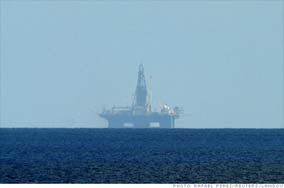Will Cuba soon be an oil play?
- Submitted by: admin
- United States
- Politics and Government
- 07 / 14 / 2010

Change to the U.S. economic embargo on Cuba might be drawing near. A bill relaxing the embargo on trade and travel was passed a few weeks ago by the House Agriculture Committee, the furthest this type of legislation has made it in Congress.
It could get to the House floor this month, though opposition remains fierce and passage is far from assured.
The bill arrives at a time when Cuba is exploring almost 20 billion barrels of oil off its coast. Partnerships with numerous foreign oil companies are reversing Cuba’s isolated tendencies.
Repsol, the huge Spanish oil company, drilled in 2004 at Yamagua soon after the discovery. Yamagua was the first deepwater well in Cuban waters, says Ron Harper, area coordinator for the Caribbean, Central America, and Ecuador at IHS Global Insight.
The company says results were encouraging although Harper says Repsol only found noncommercial hydrocarbons. Repsol, acting as operator, holds a 40% stake in the six-block (of a total 59 owned by Cuba) consortium off shore Cuba, while Norway’s Statoil and ONGC Videsh Limited (OVL) of India each own 30% stakes.
The second well in Cuba will be in Jaguey, where there is believed to be commercial resources, Harper says. But the BP situation has delayed drilling in Cuba’s northern waters. Nonetheless, foreign oil companies continue to make plans in Cuba. In total, 17 of the 59 blocks have contracts.
At the annual shareholders’ meeting for Russia’s Gazprom Neft last week, the oil company’s head announced hopes to join with Petronas, a Malaysian state-run oil company, in its Cuba projects. Gazprom Neft would like to have a deal by this month. PetroVietnam, Brazil’s Petrobras, and Venezuela’s PDVSA have contracts with Cuba, as well.
Cuban technology in deepshore drilling is limited, but analysts say that after a 3-5 year development period, Cuba’s reserves could produce 300,000 barrels/day.
U.S. oil companies are currently prohibited from engaging in exploration of Cuba’s waters, but they are watching closely. “We’re monitoring the situation,” says Chevron spokesperson Kurt Glaubitz, although he was reluctant to speculate on the prospects of a relaxed embargo.
The International Association of Drilling Contractors, a Houston-based drilling group, seems to be utilizing this opportunity to be at the forefront in pushing for American deepwater drilling in offshore Cuba.
In August, in a government-approved trip, officials of the IADC plan to discuss safety and environmental issues with Cuban authorities, as Cuba lacks the technology needed for an emergency clean-up scenario.
The delegation also will examine the potential for deepwater drilling off Cuba’s shores. The IADC, with its members mostly U.S. companies, has been appealing to the Treasury Department’s Office of Foreign Assets Control “the urgency of beginning a dialogue with Cuba” as the island steps up its exploration, according to a statement.
Referring to the potential of U.S. contracts in Cuban waters, Albert Fox, president of the Alliance for Responsive Cuba Policy Foundation, says he believes that “when we want it to happen, we can make it happen very quickly.”
The bill arrives at a time when Cuba is exploring almost 20 billion barrels of oil off its coast. Partnerships with numerous foreign oil companies are reversing Cuba’s isolated tendencies.
Repsol, the huge Spanish oil company, drilled in 2004 at Yamagua soon after the discovery. Yamagua was the first deepwater well in Cuban waters, says Ron Harper, area coordinator for the Caribbean, Central America, and Ecuador at IHS Global Insight.
The company says results were encouraging although Harper says Repsol only found noncommercial hydrocarbons. Repsol, acting as operator, holds a 40% stake in the six-block (of a total 59 owned by Cuba) consortium off shore Cuba, while Norway’s Statoil and ONGC Videsh Limited (OVL) of India each own 30% stakes.
The second well in Cuba will be in Jaguey, where there is believed to be commercial resources, Harper says. But the BP situation has delayed drilling in Cuba’s northern waters. Nonetheless, foreign oil companies continue to make plans in Cuba. In total, 17 of the 59 blocks have contracts.
At the annual shareholders’ meeting for Russia’s Gazprom Neft last week, the oil company’s head announced hopes to join with Petronas, a Malaysian state-run oil company, in its Cuba projects. Gazprom Neft would like to have a deal by this month. PetroVietnam, Brazil’s Petrobras, and Venezuela’s PDVSA have contracts with Cuba, as well.
Cuban technology in deepshore drilling is limited, but analysts say that after a 3-5 year development period, Cuba’s reserves could produce 300,000 barrels/day.
U.S. oil companies are currently prohibited from engaging in exploration of Cuba’s waters, but they are watching closely. “We’re monitoring the situation,” says Chevron spokesperson Kurt Glaubitz, although he was reluctant to speculate on the prospects of a relaxed embargo.
The International Association of Drilling Contractors, a Houston-based drilling group, seems to be utilizing this opportunity to be at the forefront in pushing for American deepwater drilling in offshore Cuba.
In August, in a government-approved trip, officials of the IADC plan to discuss safety and environmental issues with Cuban authorities, as Cuba lacks the technology needed for an emergency clean-up scenario.
The delegation also will examine the potential for deepwater drilling off Cuba’s shores. The IADC, with its members mostly U.S. companies, has been appealing to the Treasury Department’s Office of Foreign Assets Control “the urgency of beginning a dialogue with Cuba” as the island steps up its exploration, according to a statement.
Referring to the potential of U.S. contracts in Cuban waters, Albert Fox, president of the Alliance for Responsive Cuba Policy Foundation, says he believes that “when we want it to happen, we can make it happen very quickly.”
Terra Stanley is an intern at Forbes from Wellesley College.
Source: blogs.forbes.com/b
Comments